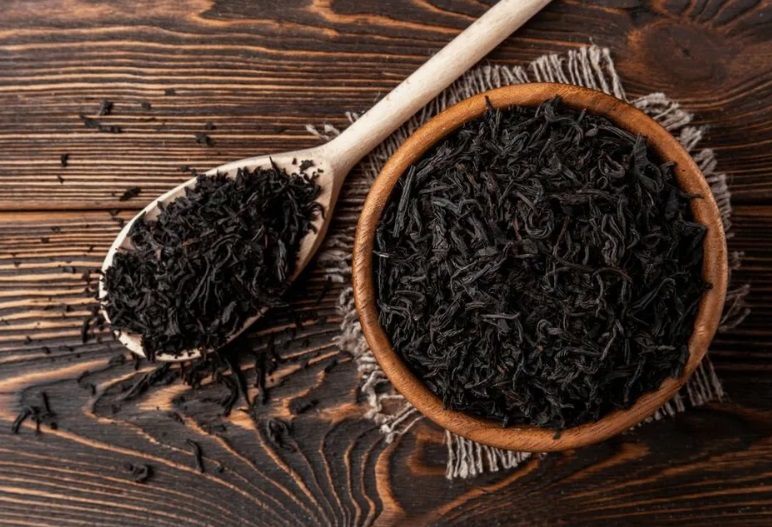Guide to Black Tea: Origin, Benefits, Uses
Black tea is one of the most popular beverages in the world, cherished for its robust flavor, versatility, and numerous health benefits. Whether enjoyed as your morning pick-me-up, a cozy afternoon indulgence, or even a key ingredient in skincare, it holds a special place in our daily lives. In this article, we’ll explore what it is, where it grows, its incredible benefits, how it can be used, and the health cures it offers.
**What is Black Tea and Where Does it Grow?**
Its distinctive dark color and bold flavor are the result of a longer oxidation process compared to other types of it, such as green or white tea. During oxidation, the tea leaves are exposed to air, allowing them to undergo natural chemical changes that deepen the flavor and add complexity.
It is cultivated globally, with some of the most renowned tea-producing regions being:
1. **India**: Known for its Assam, Darjeeling, and Nilgiri varieties, each offering unique flavors and aromas.
2. **China**: Famous for traditional black teas like Keemun and Lapsang Souchong, which are rich and smoky.
3. **Sri Lanka (Ceylon)**: Produces teas with a bright and brisk character.
4. **Kenya**: A leading producer of strong, full-bodied black teas commonly used in blends.
5. Other regions such as Nepal, Rwanda, and Vietnam also contribute to global black tea production.
The quality and flavor of black tea often reflect the region where it was grown, thanks to factors like soil type, climate, and altitude.
—
**What Are the Benefits of Black Tea?**
It is not only a delicious and energizing drink, but it also comes packed with a host of benefits. Here’s why it’s so highly regarded:
1. **Rich in Antioxidants**: It contains powerful antioxidants like polyphenols and catechins. These compounds help combat free radicals, which can damage cells and lead to premature aging, cancer, and other chronic illnesses.
2. **Boosts Heart Health**: Consuming black tea in moderation has been associated with a reduced risk of heart disease. The flavonoids in black tea help lower ‘bad’ LDL cholesterol and improve overall heart function.
3. **Improves Mental Alertness**: Thanks to its moderate caffeine content, it provides a gentle boost of energy, improving focus and mental clarity without causing the jitteriness that coffee might.
4. **Supports Digestive Health**: It contains tannins that have antimicrobial properties, which can support a healthy gut and aid digestion.
5. **Regulates Blood Sugar**: Some studies suggest that drinking black tea can help decrease blood sugar levels and reduce the risk of type 2 diabetes.
6. **Reduces Stress**: L-theanine, an amino acid found in tea leaves, promotes relaxation and helps reduce stress while maintaining alertness.
—
**Where and How Can We Use Black Tea?**
Black tea is incredibly versatile and can be used in various ways beyond being a standard beverage. Here are some applications:
1. **As a Beverage**:
– **Plain or Sweetened**: Enjoyed hot or cold, with lemon, honey, or milk for added flavor.
– **Blended Teas**: It is the base for popular blends like Earl Grey (flavored with bergamot) and chai (a spiced tea blend).
– **Iced Tea**: Made by brewing and refrigerating black tea, perfect for warm weather refreshment.
2. **Culinary Uses**:
– **Cooking and Baking**: Black tea can be used in recipes for cakes, cookies, and soups to add a unique depth of flavor.
– **Marinades and Sauces**: Its smoky, earthy notes pair well with savory dishes, especially in rubs and glazes.
3. **In Skincare**:
– **Natural Astringent**: The tannins in black tea make it an excellent toner for oily skin.
– **Puffy Eyes Remedy**: Used tea bags can reduce puffiness and dark circles when applied to the eyes.
– **Anti-Aging**: Black tea’s antioxidants promote skin health and radiance.
4. **As a Hair Rinse**:
– Black tea rinses can add shine to hair and prevent dandruff and gray hair.
—
**What Are Its Health Cures?**
Black tea has been used for centuries in traditional medicine, both internally and externally. Here are some notable health cures:
1. **Soothes Stomach Issues**: Sipping black tea can calm an upset stomach, ease diarrhea, and alleviate bloating.
2. **Enhances Immunity**: Compounds like alkylamine in black tea can support immune function, helping the body fight off infections.
3. **Relieves Stress and Anxiety**: The calming effects of L-theanine and other compounds in black tea can promote mental relaxation and reduce stress.
4. **Aids Weight Management**: Drinking black tea may boost metabolism and aid in weight loss when paired with a balanced diet.
5. **Supports Respiratory Health**: Hot black tea works as a natural decongestant, soothing colds and sore throats.
6. **Protects Bones**: Regular consumption of black tea has been linked to improved bone density and strength over time, thanks to its beneficial compounds.
—

Unveiling the Practical Magic of Black Tea
Black tea, that ubiquitous beverage found in pantries worldwide, is more than just a morning pick-me-up. Its rich history, bold flavor, and invigorating properties have cemented its place as a staple, but its versatility extends far beyond the cup. Let’s delve into the practical applications of brewed it, alongside a guide on how to brew the perfect cup.
Practical Applications of Brewed Black Tea: Beyond the Beverage
Believe it or not, that leftover pot of black tea can be surprisingly useful around the house! Here are a few practical applications you might not have considered:
Tannin Powerhouse: Black tea is rich in tannins, a natural astringent with several benefits:
Tenderizing Tough Meat: Marinating tougher cuts of meat in brewed black tea overnight can help break down proteins and tenderize them, resulting in a more succulent final product. The tea also imparts a subtle earthy flavor.
Natural Wood Stain: The tannins in black tea can be used to create a natural and eco-friendly wood stain. Adjust the strength of the brew for lighter or darker shades. Apply with a brush and let it dry completely before sealing.
Soothing Minor Burns and Sunburn: Cool, brewed black tea can be applied to minor burns and sunburns to help soothe the affected area. The tannins act as an astringent, drawing out heat and promoting healing. Simply soak a clean cloth in the tea and apply it to the burn.
Gardening Ally: Black tea benefits extend to the garden as well:
Acid-Loving Plant Food: Diluted, cooled black tea can be used as a fertilizer for acid-loving plants like azaleas, rhododendrons, and ferns. The tea provides essential nutrients and helps lower the soil’s pH.
Compost Booster: Adding used tea leaves (especially those from black tea) to your compost pile can help speed up the decomposition process. The leaves provide nitrogen and help aerate the compost.
Pest Deterrent: Some gardeners claim that spraying diluted black tea on plants can help deter certain pests. While not scientifically proven, the strong scent may repel some insects.
Household Helper: You can even leverage black tea for certain household tasks:
Eliminating Fish Odor: After handling fish, washing your hands with brewed black tea can help neutralize the lingering odor. The tannins bind with the odor-causing compounds, leaving your hands smelling fresh.
Shine and Strengthen Hair: Used, cooled black tea can be used as a hair rinse after shampooing. It can add shine, darken the hair (especially beneficial for brunettes), and even help strengthen hair follicles.
How to Brew the Perfect Cup of Black Tea
Now that you know what to do with your brewed black tea, let’s ensure you’re brewing it to perfection in the first place. Here’s a step-by-step guide:
Gather Your Essentials:
High-quality loose leaf or tea bags of black tea.
Fresh, filtered water.
A kettle or pot for heating water.
A teapot, infuser, or mug.
A thermometer (optional, but recommended for precision).
Heat the Water: The optimal water temperature for black tea is around 212°F (100°C), which is a full, rolling boil.
Warm the Teapot (Optional): Rinsing your teapot or mug with hot water before brewing helps maintain the temperature and prevent it from cooling down too quickly.
Measure the Tea: Use about 1 teaspoon of loose leaf tea per 8 ounces (240ml) of water, or one tea bag per cup. Adjust to your preference.
Pour the Water: Pour the boiling water over the tea leaves or bag in your teapot or mug.
Steep: Steep the tea for 3-5 minutes, depending on the type of black tea and your desired strength. Stronger teas like Assam might only need 3 minutes, while milder teas like Darjeeling can steep for 5.
Remove Tea Leaves/Bag: Once steeped, remove the tea leaves or bag to prevent the tea from becoming bitter.
Serve and Enjoy: Pour the tea into your cup and enjoy it plain or with milk, sugar, lemon, or honey to taste.
Tips for a Superior Brew:
Use fresh, filtered water: Avoid using tap water with chlorine or other impurities, as this can affect the taste of the tea.
Don’t over-steep: Over-steeping can result in a bitter and unpleasant tea.
Experiment with different types of black tea: From the malty notes of Assam to the floral aromas of Darjeeling, there’s a black tea to suit every palate.
Store the tea correctly: To preserve the freshness and flavor of the tea, the container should be airtight. A cool, dark place is suitable.
Black tea, with its rich flavor and varied practical applications, proves to be a versatile addition to any home. From tenderizing meats and staining wood to fertilizing your garden and brewing the perfect cup, the possibilities are surprisingly endless. So, next time you brew a pot of black tea, remember its potential extends far beyond the traditional tea break. Embrace its versatility and discover the practical magic it holds!
**Conclusion**
Black tea has earned its reputation as one of the world’s most beloved drinks, offering a combination of bold flavors, incredible versatility, and a wealth of health benefits. Whether you’re sipping it to boost your energy, applying it to your skin for a natural glow, or using it in your culinary creations, it is a timeless and valuable ingredient. Its ability to soothe the mind, heal the body, and improve overall well-being makes it a staple worth adding to your daily routine. So the next time you brew a cup of it, remember that you’re not just enjoying a drink; you’re embracing an ancient tradition of health and harmony.
You can read below writings
The Humble Onion: A Culinary Staple with Remarkable Benefits
What is White Cabbage and Where Does it Grow
What is Coffee and Where Does It Grow
Linden: Nature’s Calming and Healing Wonder
Lemon: The Tangy Wonder – Benefits, Uses, and More






